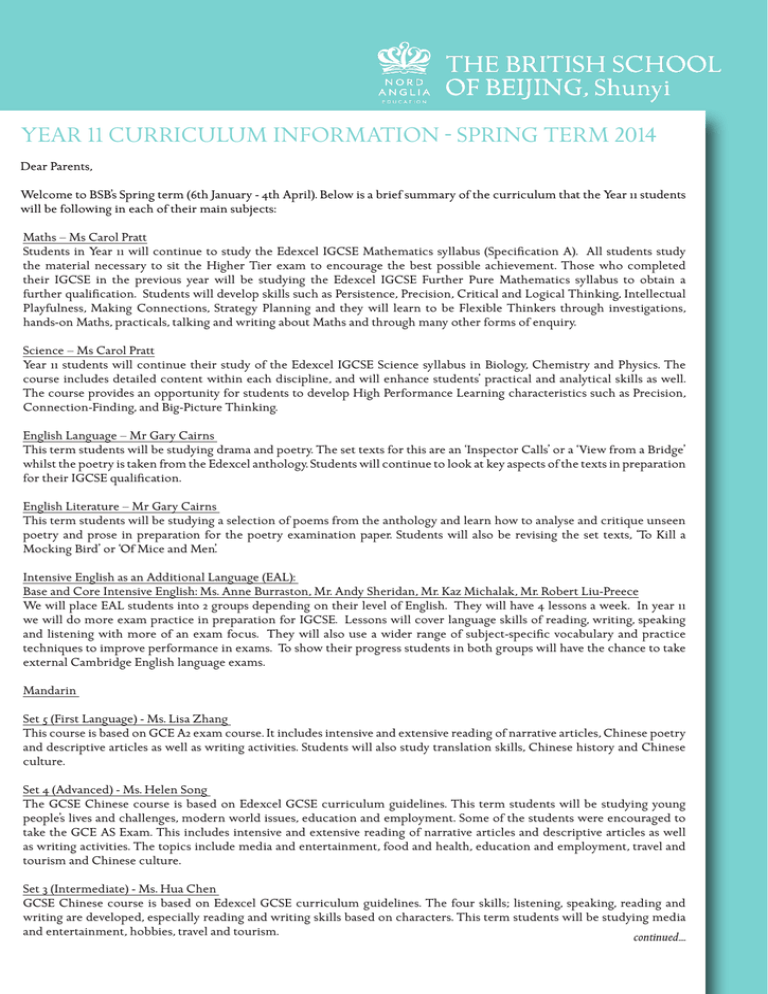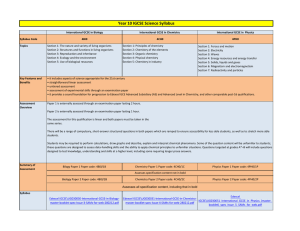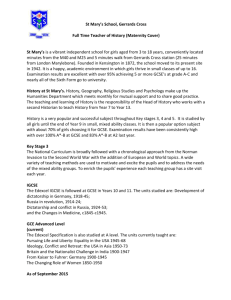Year 11 CURRICULUM INFORMATION
advertisement

Year 11 CURRICULUM INFORMATION - SPRING TERM 2014 Dear Parents, Welcome to BSB’s Spring term (6th January - 4th April). Below is a brief summary of the curriculum that the Year 11 students will be following in each of their main subjects: Maths – Ms Carol Pratt Students in Year 11 will continue to study the Edexcel IGCSE Mathematics syllabus (Specification A). All students study the material necessary to sit the Higher Tier exam to encourage the best possible achievement. Those who completed their IGCSE in the previous year will be studying the Edexcel IGCSE Further Pure Mathematics syllabus to obtain a further qualification. Students will develop skills such as Persistence, Precision, Critical and Logical Thinking, Intellectual Playfulness, Making Connections, Strategy Planning and they will learn to be Flexible Thinkers through investigations, hands-on Maths, practicals, talking and writing about Maths and through many other forms of enquiry. Science – Ms Carol Pratt Year 11 students will continue their study of the Edexcel IGCSE Science syllabus in Biology, Chemistry and Physics. The course includes detailed content within each discipline, and will enhance students’ practical and analytical skills as well. The course provides an opportunity for students to develop High Performance Learning characteristics such as Precision, Connection-Finding, and Big-Picture Thinking. English Language – Mr Gary Cairns This term students will be studying drama and poetry. The set texts for this are an ‘Inspector Calls’ or a ‘View from a Bridge’ whilst the poetry is taken from the Edexcel anthology. Students will continue to look at key aspects of the texts in preparation for their IGCSE qualification. English Literature – Mr Gary Cairns This term students will be studying a selection of poems from the anthology and learn how to analyse and critique unseen poetry and prose in preparation for the poetry examination paper. Students will also be revising the set texts, ‘To Kill a Mocking Bird’ or ‘Of Mice and Men’. Intensive English as an Additional Language (EAL): Base and Core Intensive English: Ms. Anne Burraston, Mr. Andy Sheridan, Mr. Kaz Michalak, Mr. Robert Liu-Preece We will place EAL students into 2 groups depending on their level of English. They will have 4 lessons a week. In year 11 we will do more exam practice in preparation for IGCSE. Lessons will cover language skills of reading, writing, speaking and listening with more of an exam focus. They will also use a wider range of subject-specific vocabulary and practice techniques to improve performance in exams. To show their progress students in both groups will have the chance to take external Cambridge English language exams. Mandarin Set 5 (First Language) - Ms. Lisa Zhang This course is based on GCE A2 exam course. It includes intensive and extensive reading of narrative articles, Chinese poetry and descriptive articles as well as writing activities. Students will also study translation skills, Chinese history and Chinese culture. Set 4 (Advanced) - Ms. Helen Song The GCSE Chinese course is based on Edexcel GCSE curriculum guidelines. This term students will be studying young people’s lives and challenges, modern world issues, education and employment. Some of the students were encouraged to take the GCE AS Exam. This includes intensive and extensive reading of narrative articles and descriptive articles as well as writing activities. The topics include media and entertainment, food and health, education and employment, travel and tourism and Chinese culture. Set 3 (Intermediate) - Ms. Hua Chen GCSE Chinese course is based on Edexcel GCSE curriculum guidelines. The four skills; listening, speaking, reading and writing are developed, especially reading and writing skills based on characters. This term students will be studying media and entertainment, hobbies, travel and tourism. continued.... Set 2 (Advanced Beginners) - Ms. Nikki Liu GCSE Chinese course is based on Edexcel GCSE curriculum guidelines. The four skills; listening, speaking, reading and writing are developed, especially reading and writing skills based on characters. This term students will be studying travel, tourism and holiday, media and hobbies. Set 1 (Beginners) - Ms. Flora Xu GCSE Chinese course is based on Edexcel GCSE curriculum guidelines. The four skills; listening, speaking, reading and writing are developed, especially reading and writing skills based on characters. This term students will be studying travel, tourism and holiday, media and hobbies. HSK Mandarin - Ms. Chiara Gilpin The course focuses on the four skills and leads to the HSK test. This term, students will be covering topics about Food and Health, occupation and future plans, Means of Transport. Spanish - Mr Alan Foster In the spring term, students will focus on revising topics that they have found difficult or they have missed out. We also are further practicing tenses such as the use of imperfect, the imperfect continuous, the conditional and simple past, the present and the perfect tense. We will practice past exam papers to improve exam technique; assessing the use of the 4 national curriculum skills; listening, speaking, reading and writing. French - Mrs. Amelie Azeem and Ms Linda Bastien This term, Year 11 students will learn to discuss tourism-related issues: from talking about holiday venues, to describing t5he weather in all tenses, students will also learn to make booking arrangements for hotel and youth hostel, and learn to make informed choices depending on the services. We will learn to use conditional, revise imperfect, perfect and future tenses and describe eating out events in detail. German Native- Mr Philipp Mende Students will do a presentation on a non-fictional topic. Furthermore, they will learn how to successfully apply for a job, including letter of application and their CV as well as performing in a job interview. Finally, students will repeat how to write an argumentative essay. Geography - Mr Ed Thomas In the Spring Term we complete the study of the Physical topics for the International GCSE (Cambridge syllabus). Weathering and plate tectonics are covered. A full mock exam consisting of the three examined areas is set in January. A range of case studies are used for this section of work from a variety of places around the world and case study type questions (worth the highest marks in the exams) are set regularly and often for homework. History - Mr Nick Bourne In the Spring Term will be starting with the History mock exam paper. Then the students will do a thorough review of the Edexcel IGCSE two year course so as to help prepare them for exam the external exam in May / June 2013. We will be looking at each topic unit in turn and answering various exam questions. The students will also be learning to handle the time for doing each question by having a series of exam question tests. Yr 11 Business In the Spring Term we complete the study of business finance and accounting and external influence topics for the International GCSE (Cambridge syllabus). A full mock exam consisting of all the Business Studies topic areas is set in January. A range of case studies are used for this section of course and case study type questions (longer response style questions) are set regularly and often for homework. Students will concentrate on their written work and examination technique using past papers in class. Drama - Mrs. Heidi Arnold Students will study a further, contrasting complete play text. They will complete 12 hours of examined drama workshops where we will look at characterisation, language and verbal communication. Students will also undertake an in depth study of one theatre practitioner. They will also need to complete a written portfolio of research and evaluation. continued.... Art – Mr Richard Harrison, Ms Charlotte Yearn, Mr Dafydd Thomas Students will complete their body of coursework based on the theme of ‘Decay’ and ‘Ordinary & Extraordinary’ They will be expected to annotate their sketchbooks, make informed links with the work of a variety of artists and develop and explore a variety of materials. Student will also begin their examinable component that forms 40% of their GCSE Grade. Year 11 Psychology Having finished their investigations into fear, students will begin their final module ‘Are criminals born or made?’ In this topic we will look at explanations of anti-social behavior and further examine the nature vs nurture argument – do our genes affect how we behave or our upbringing? We will examine the theories of criminal behavior, look at some of the techniques used by police to track and predict offenders and also look at the career of the forensic psychologist. IGCSE Physical Education- Ms. Sian Evans Year 11 will concentrate on their four chosen sports, which are filmed and edited for assessment by the Cambridge examining board. By the end of February, the teaching of the theory element will have been completed and the students can concentrate on revision and exam question practice. The students will also practice towards mastering the analysis, evaluation and improvement of their own and others’ sports performances. Core Physical Education- Mr. Travis Washko This term the students will be given options to study changing every five weeks. The options offered will be touch rugby, contemporary street dance, floor hockey, badminton, handball and football. The choices of sports have been designed to complement the school’s sports program. ICT - Mr. Nathaniel Brown This term students will be looking at data capture and different ways in which information is collected and processed for reporting. They will then learn how to create a website using Serif Web Plus. When they create the website they will learn how to embed videos and sounds as well as use colours, layout and links effectively. They will then finish the term by learning about some of the ways that ICT interacts with society in positive and negative ways identifying areas where technology can be used for good and ways that it can have unintended consequences. Design & Technology – Mr Richard Harrison, Mr Christopher Cundall, Mr Kevin Lawler GCSE Coursework (Graphics and Resistant Materials) The IGCSE Design and Technology syllabus enables learners to identify, consider and solve problems through creative thinking, planning and design, and by working with different media, materials and tools. As a result, learners gain greater technical and design awareness, while developing skills such as initiative, resourcefulness, enquiry and ingenuity. This term will see Year 11 complete their coursework project and then begin their theory recap and exam preparations. Depending on the student’s option choice: • Graphic products will focus on several areas of design, including: Packaging, Promotional design, Point of Display, Product design, Manuals, Transport, Architectural modelling, Corporate identity and Interior design. • Resistant Materials will focus on the he general physical and working properties of common construction materials (plastics, woods and metals) in relation to specific designing and making tasks.


